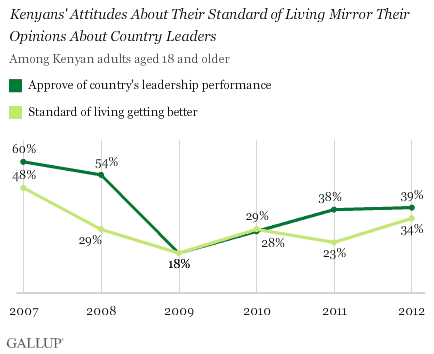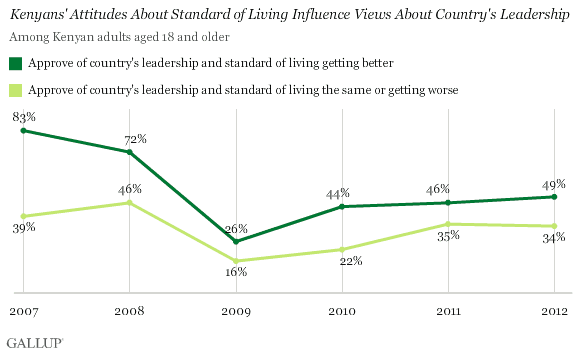WASHINGTON, D.C. -- Ahead of Kenya's next presidential election in March 2013, Gallup surveys show 39% of voting-age Kenyans approve of their country's leadership and 34% see their standard of living getting better. Both measures are lower than they were a few months before Kenya's last presidential election in 2007.

Kenyans' attitudes reflect the major changes they have lived through in the past five years: Kenyans have elected a president, dealt with the serious violence that followed that election, and coped with its effects on their economy. They also witnessed the formation of a coalition government and approved a new constitution. While voting-age Kenyans' approval ratings of their leadership have improved considerably since bottoming out in 2009 -- one year into the Grand Coalition government's tenure -- they are still well below the 2007 level when six in 10 approved.
As in most countries around the world, the economy plays an important role in people's decisions on Election Day. In fact, job creation tops Kenyans' list of most important issues the government should handle in the next 12 months. Overall, Kenyans' views about their standard of living have roughly mirrored those of their country's leadership approval since 2007.
Further analysis reveals voting-age Kenyans' attitudes about their personal economics are closely related to their approval of their country's leadership. Year after year, Kenyans who say their standard of living is "getting better" are more likely than those who say it is "getting worse" or "staying the same" to approve of the job performance of their country's leadership.

These results hold true even when accounting for gender, age, and education. However, the gap between the two groups was smallest in 2009 (10 percentage points) and has remained relatively narrow since.
Implications
While Kenyans who are optimistic about their standard of living are more likely than those who are less positive to approve of the country's leadership, the gap between the two groups has narrowed. In fact, less than a majority who view their living standards as getting better also approve of the country's leadership. Such findings suggest that factors beyond economics are influencing Kenyans' perceptions about the national leadership -- particularly as Kenya's economy has gradually stabilized in recent months.
In light of these findings, and considering the violence after the last presidential election and seeing how it has affected Kenyans' lives and the country's economy, it is important to gauge public sentiment in the months leading to the next presidential election. Between August 2012 and February 2013, Gallup is conducting four nationally representative surveys in Kenya to measure how Kenyans feel about the elections, the country's electoral environment, and their overall well-being.
For complete data sets or custom research from the more than 150 countries Gallup continually surveys, please contact us.
Survey Methods
Results are based on face-to-face interviews with adults, aged 18 and older, conducted between 2007 and 2012 in Kenya. The samples sizes ranged from a low of 915 in 2007 to a high of 2,067 adults, aged 18 and older, in 2008. For results based on the sample sizes, one can say with 95% confidence that the margin of sampling error ranged from ±4.2 percentage points in 2008 to ±7.1 percentage points in 2007 for the approval of county leadership question. The margin of error reflects the stratification and clustering of the sample design. In addition to sampling error, question wording and practical difficulties in conducting surveys can introduce error or bias into the findings of public opinion polls.
For more complete methodology and specific survey dates, please review Gallup's Country Data Set details.
